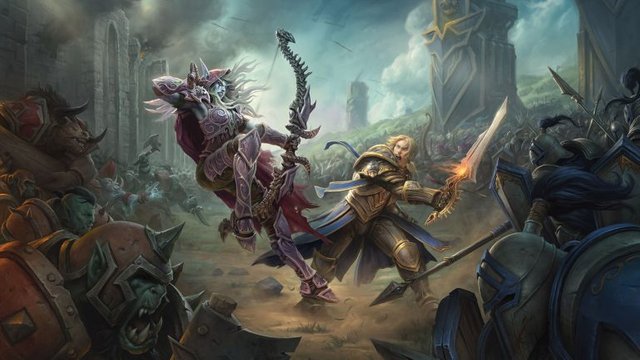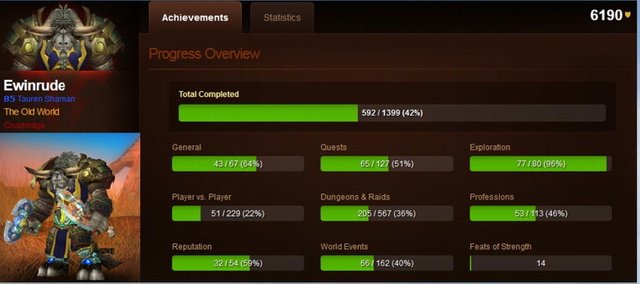WoW: Why You Play Affects How You Play

World of Warcraft (WoW) is the world’s most subscribed to Massively Multiplayer Online Role Playing Game (MMORPG). It was launched in 2004 as part of Blizzard Entertainment’s Warcraft game franchise and has had six game expansions to date with the seventh, Battle for Azeroth, to be released on Tuesday 14th August 2018. The game’s longevity is due its ability to continuously appeal to new recruits and veteran gamers. What it is about WoW that makes it so appealing to so many people? Research suggests that there are ten main reasons that gamers engage with WoW.
A 2013 study by Billiex, Van der Linden, Achab et al entitled ‘Why do you play World of Warcraft? An in-depth exploration of self-reported motivations to play online and in-game behaviours in the vitual world of Azeroth’ investigated gamers’ motivations for playing WoW and if their motivation affects the way in which they play the game. The study was conducted using 690 adult WoW gamers aged 18-66. The first part of the study involved the participants completing a survey about their motivations for playing WoW. According to this study, the ten motivations for playing WoW are:
- Advancement: the desire to gain power, progress rapidly and accumulate in-game symbols of wealth or status.
- Mechanics: an interest in analysing the underlying rules and system in order to optimise character performance.
- Competition: the desire to challenge and compete with others.
- Socialising: an interest in helping and chatting with other players.
- Relationship: the desire to form long-term meaningful relationships with others.
- Teamwork: deriving satisfaction from being part of a group effort.
- Discovery: the desire to find out and know the game’s elements or places that most players do not know about.
- Role-play: the tendency to create a character with a background story and the desire to interact with other players according to their story.
- Customisation: an interest in customising the appearance of their avatar.
- Escapism: a tendency to use the online environment to avoid thinking about real-life problems

Gamers whose main motivation was in-game advancement spent the most hours per week playing, even more than participants who were motivated by competition. Gamers who were motivated by advancement were most likely to engage in dungeon and raid missions. This is likely because these types of quests give characters the most amount of experience and the best loot or rewards. Hence, the more dungeons and raids a character successfully completes, the faster they will advance through the game.
Gamers who were motivated by competition were most likely to play in cybercafés and to play on servers which allow player vs. player combat. While these gamers enjoyed the competition in the moment, this did not translate to a prolonged desire to develop their avatar to be the wealthiest, most skilled, most experienced character in their guild or on their server.
Gamers who mainly play WoW to socialise and form relationships were most likely to join guilds and reasonably likely to join dungeon and raid missions. This is likely because these quests require interaction with other players and so increase the likelihood of forming more substantial in-game relationships. Joining guilds also creates the opportunity to regularly interact with other guild members. Overtime, these interactions can lead to in-game alliances and offline friendships. Hence, it makes sense that gamers who play games to socialise would seek out game features that allow them to communicate with other players.
Participants who were motivated by discovery on average completed the greatest number of quests and explored the most of Azeroth. They had reasonable rates of game progression but not as much as those who were motivated by advancement. This suggests that when choosing quests, those motivated by discovery would accept quests which yield relatively low experience if these quests allowed them to explore more of Azeroth.
Part of WoW’s appeal is the fact that players can mould their game play to suit their motivation. As such, each player can customise their experience to make it personally fulfilling. This means that WoW can appeal to a wide range of people for a wide range of reasons and that it is at least part of the secret to its success.


Very interesting findings from the study as more Companies look for this formula to engage its players and form communities.
Indeed! WoW certainly was one of those massive successes. Lets hope blizzard carries it on with other games (Overwatch is doing pretty good as well!)
Thanks for the post, gamersclassified.
This bot runs through hundreds of posts per day selecting a small percentage of posts that have exceptional positivity.
Your post has been selected and upvoted because it has a high concentration of positive words that give feel-good vibes. Thank you for creating content that focuses on the bright side.
Your post has also been entered to be included in a daily roundup of positive posts.Please comment 'yes' or 'no' if you feel that my bot is correct in its judgement of this post. Your comments will be used to determine if this article belongs in the curated list. Over time, your feedback will be used to improve the judgement of this bot
Thank you for the feedback and support~!